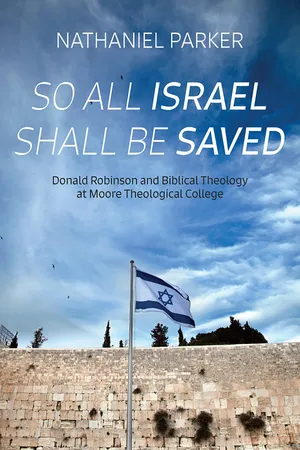
So All Israel Shall Be Saved
Donald Robinson and Biblical Theology at Moore Theological College
- English
- ePUB (mobile friendly)
- Available on iOS & Android
So All Israel Shall Be Saved
Donald Robinson and Biblical Theology at Moore Theological College
About this book
Is it feasible to speak of a Moore School of Biblical Theology? The biblical theology program at Moore Theological College can be traced back to Donald Robinson. One unique contribution of Robinson to Moore's program was his distinction theology concerning the role of Israel in redemption history as his attempt at providing an alternative to dispensationalism and covenant theology. By examining Robinson's view of Jew and gentile in the New Testament church, the reciprocal role of the gospel going forth from Jewish Christians to the gentiles and back to unbelieving Jews (to fulfill the Rom 11 promise "so all Israel shall be saved") and Robinson's eschatological concept of both Jew and gentile forming a new man, and by tracing how his view has been affirmed, revised, rejected, or ignored by biblical theologians at Moore College who were influenced by or who followed Robinson (including Graeme Goldsworthy, Lionel Windsor, D. Broughton Knox, and William Dumbrell), this book seeks to clarify the reception of Robinson's legacy at Moore College as well as offer an assessment on the plausibility of a distinct Moore School of Biblical Theology.
Frequently asked questions
- Essential is ideal for learners and professionals who enjoy exploring a wide range of subjects. Access the Essential Library with 800,000+ trusted titles and best-sellers across business, personal growth, and the humanities. Includes unlimited reading time and Standard Read Aloud voice.
- Complete: Perfect for advanced learners and researchers needing full, unrestricted access. Unlock 1.4M+ books across hundreds of subjects, including academic and specialized titles. The Complete Plan also includes advanced features like Premium Read Aloud and Research Assistant.
Please note we cannot support devices running on iOS 13 and Android 7 or earlier. Learn more about using the app.
Information
Table of contents
- Title Page
- Abstract
- Preface
- Acknowledgments
- Abbreviations
- 1. Introduction
- 2. A Historical Survey of Israel’s Role in Redemptive History Within Anglicanism
- 3. A Brief History of Moore Theological College and Donald Robinson’s Distinction Theology
- 4. Departing from Robinson
- 5. Fully Departed from Robinson
- 6. Toward a Robinson Revival
- 7. Summary and Conclusion
- Afterword
- Bibliography